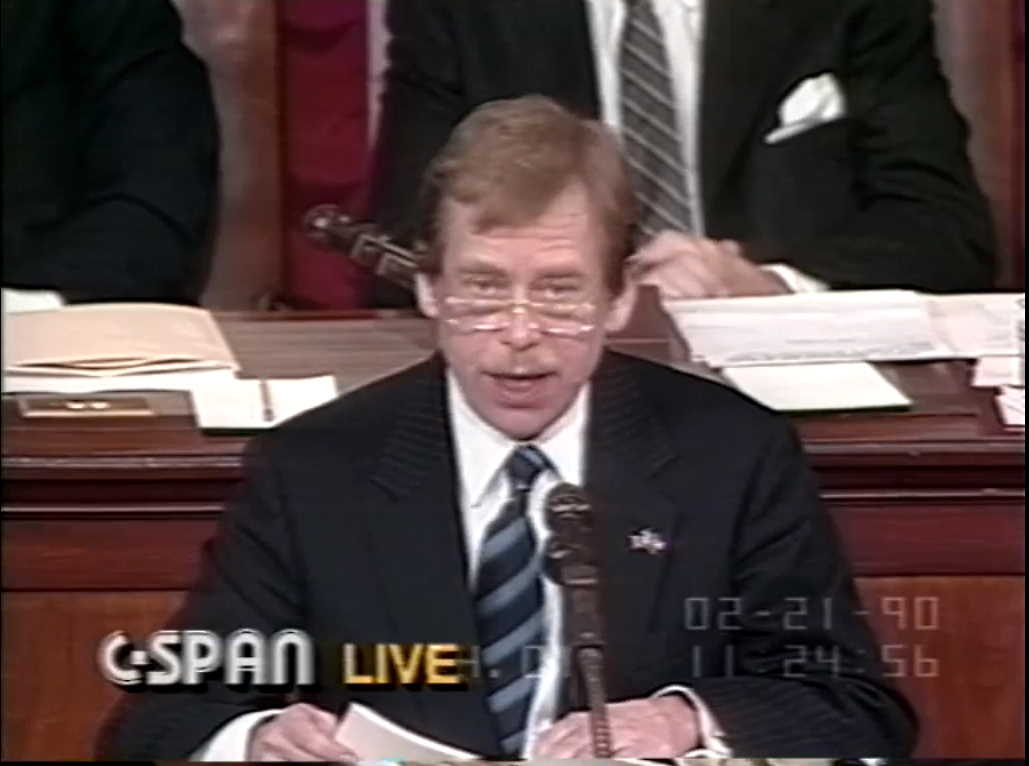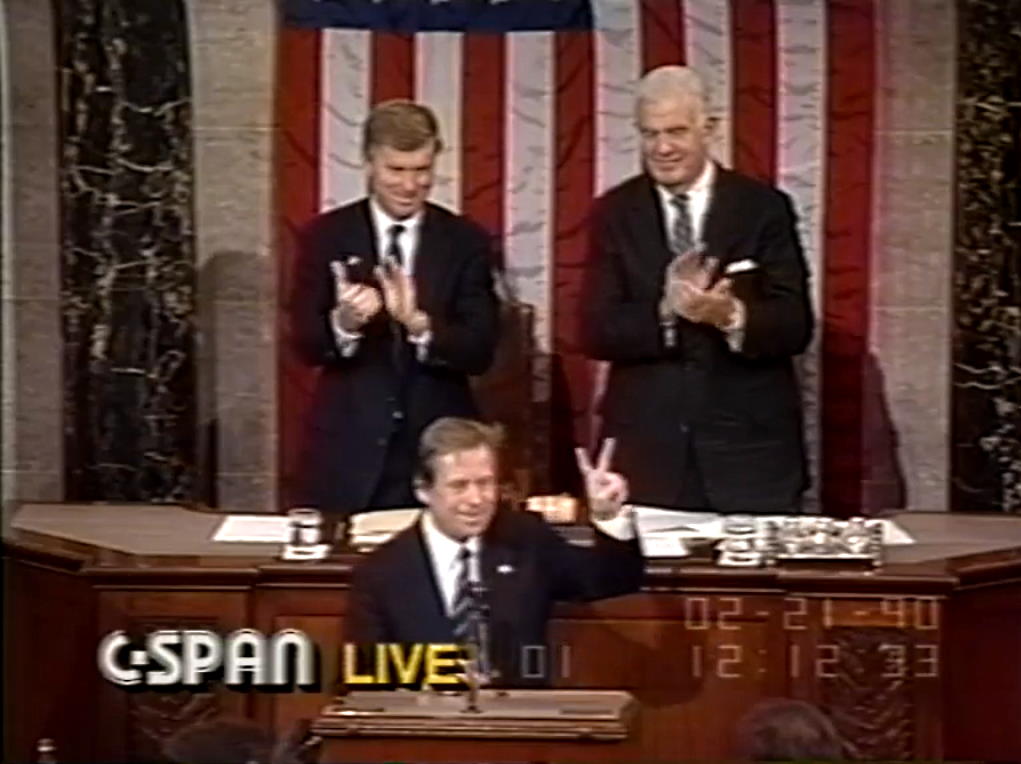It has been 30 years since then-Czechoslovak President Václav Havel went to Washington and New York, his most famous foreign trip. George H.W. Bush was US president at the time.
This was Havel’s first trip to the United States, and he was the first politician from the newly liberated Eastern bloc to address a joint session of the US Congress. His February 21, 1990, speech was met with applause 23 times.
A day earlier, he went to the Library of Congress and saw a draft copy of Czechoslovak Declaration of Independence from October 1918. At Arlington Cemetery, he visited the Tomb of the Unknown Soldier and left flowers at the grave of President John Fitzgerald Kennedy.
President Bush during at a photo opportunity at the White House asked whether anyone spoke “Czechoslovakian.” Later, at a podium in front of the White House, he was more serious and said Czechoslovakia would be granted “the most liberal access to the American market possible under United States law.” Havel described the talks with Bush as “very warm, very open and very friendly discussions.”
His speech to Congress was the highlight of the trip. The entire speech can be seen in the archives of C-Span.
He greeted the politicians and public, and spoke briefly in English. “My advisers advised me to speak on this important occasion in Czech. I don’t know why. Perhaps because they wanted you to enjoy the sweet sounds of my mother tongue,” Havel said. He then switched to Czech, which was translated by Michael Žantovský, his press secretary, and recounted his recent arrest just before the Velvet Revolution. He added that when he first heard rumors about possibly becoming president, he thought it was a joke.
He said that less than four months ago, the country was in the grips of one of the most conservative communist governments in Europe. “Today, less than four months later, I’m speaking to you as the representative of a country that has set out on the road to democracy, a country where there is complete freedom of speech, which is getting ready for free elections and which wants to create a prosperous market economy and its own foreign policy,” he said.
He recounted much of the history of the 20th century, leading up to the collapse of the Soviet influence over Central and Eastern Europe. “This, I am firmly convinced, is a historically irreversible process and, as a result, Europe will begin again to seek its own identity without being compelled to be a divided armory any longer,” he said, adding that the US should not have to intervene in another European conflict.
He did mention one way the US could be involved. “I often hear the question: How can the United States of America help us today? My reply is as paradoxical as the whole of my life has been. You can help us most of all if you help the Soviet Union on its irreversible but immensely complicated road to democracy,” he said.

He talked at some length about reducing the numbers of both Soviet and American troops in Europe, and the hope that Czechoslovakia could look after its own security. “Our freedom, independence and our newborn democracy have been purchased at great cost, and we shall not surrender them,” he said.
Havel soon turned to more philosophical ideas. “Ladies and gentlemen, I’ve only been president for two months, and I haven’t attended any schools for presidents. My only school was life itself. Therefore, I don’t want to burden you any longer with my political thoughts,” he said.
He called for a complete change in attitude. “The salvation of this human world lies nowhere else than in the human heart, in the human power to reflect, in human meekness and in human responsibility. Without a global revolution in the sphere of human consciousness, nothing will change for the better in the sphere of our being as humans, and the catastrophe toward which this world is headed — be it ecological, social, demographic or a general breakdown of civilization — will be unavoidable,” he said.
“We are still destroying the planet that was entrusted to us and its environment. We still close our eyes to the growing social, ethnic and cultural conflicts in the world. From time to time, we say that the anonymous megamachinery we have created for ourselves no longer serves us but rather has enslaved us, yet we still fail to do anything about it,” he added.

He concluded his remarks in English. “When Thomas Jefferson wrote that ‘governments are instituted among men, deriving their just powers from the consent of the governed,’ it was a simple and important act of the human spirit. What gave meaning to that act, however, was the fact that the author backed it up with his life. It was not just his words; it was his deeds as well,” he said.
“I will end where I began: History has accelerated. I believe that once again it will be the human mind that will notice this acceleration, give it a name and transform those words into deeds. Thank you,” he concluded.
After leaving Washington, he stopped in New York to meet with his friend, director Miloš Forman, as well as then-New York City Mayor David Dinkins. He visited an exhibition on Central European art the Metropolitan Museum of Art, and at Columbia University he received an honorary doctorate in law.
Nearby at St. John’s Cathedral there was a star-studded tribute to Václav Havel. Singer Paul Simon, wearing a suit and tie, performed “Bridge Over Troubled Water.” Actor Paul Newman was also present, and complimented Havel’s speech.
In film clips, Havel can be seen holding a candle as the Czech and Slovak national anthems, “Kde domov můj” and “Nad Tatrou sa blýska” play, followed by the US anthem, “The Star Spangled Banner.”
Havel visited the US several more times, including a second time in September 1990. President Bush, on Havel’s invitation, visited Czechoslovakia in November 1990.
A bust of Havel was unveiled in the National Statuary Hall of the US Capitol in Washington on November 19, 2014.












 Reading time: 5 minutes
Reading time: 5 minutes 

























